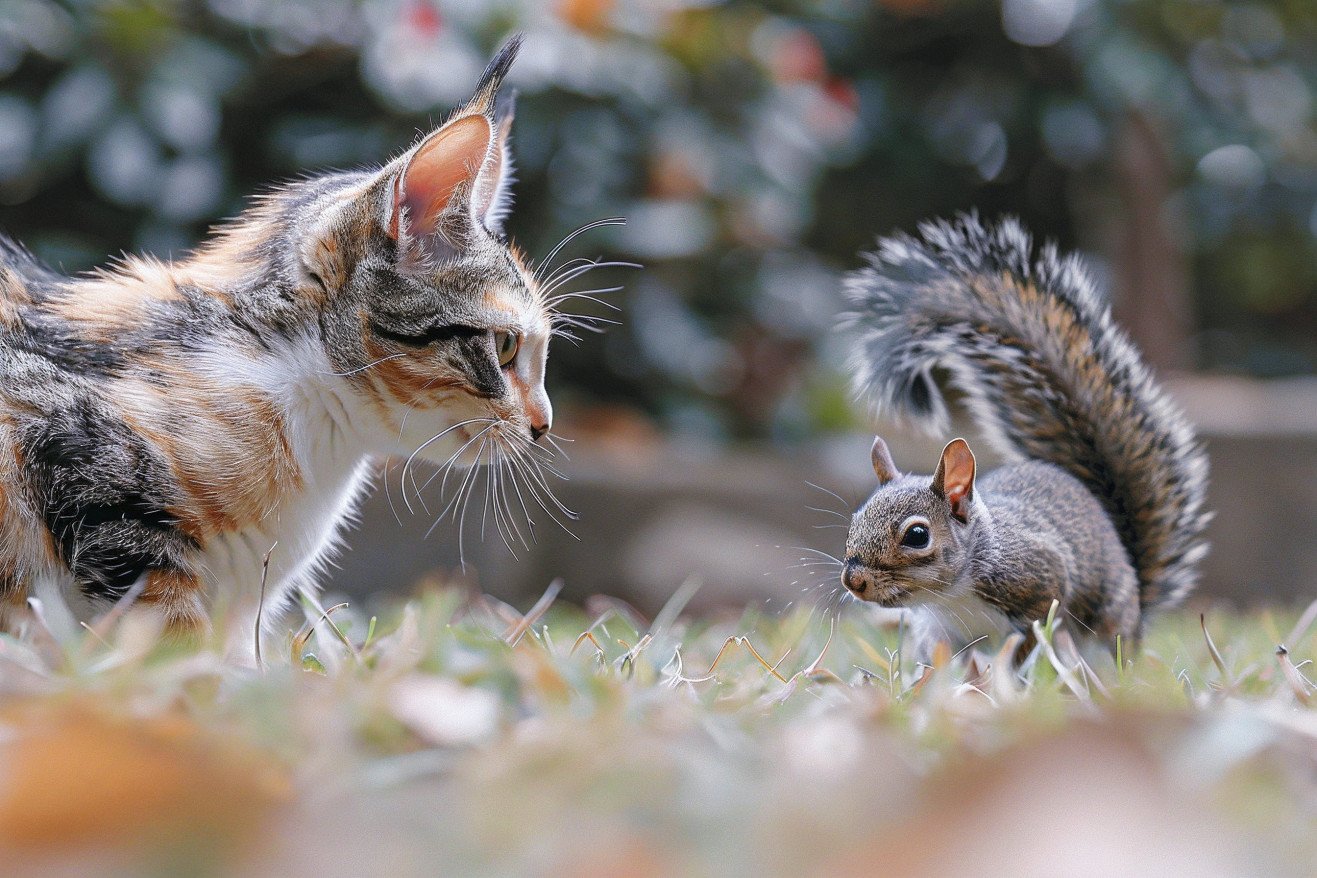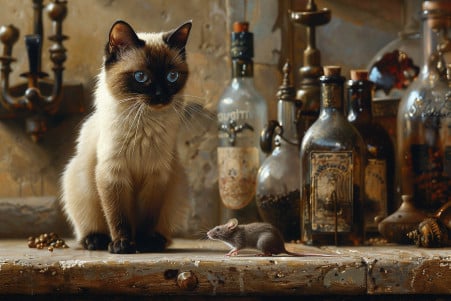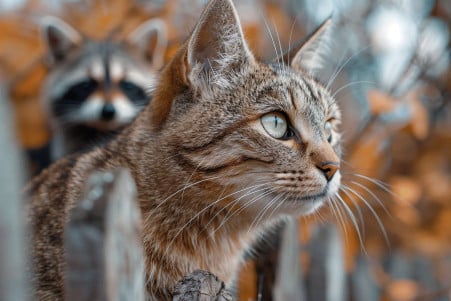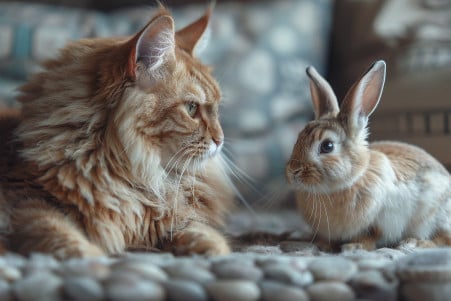Why Do Cats Like Squirrels? A Look at Your Cat's Hunting Instincts
16 May 2024 • Updated 16 May 2024

If you’ve ever seen your cat staring at the squirrels outside, you may have wondered if it’s safe for your pet to catch and eat one. While cats are obligate carnivores and squirrels would be part of their natural diet in the wild, domestic cats are fed a complete and balanced diet of commercial cat food and don’t need to eat squirrels to survive.
In this article, we’ll take a deep dive into this instinctual hunting behavior with the help of feline behavior and ecology experts. Through a review of the scientific literature and case studies, you’ll learn about the reasons for a domestic cat’s interest in hunting squirrels, as well as the dangers and moral implications of letting them do so. This investigation will help you better understand the sometimes fraught relationship between our pets and their prey.
Do cats eat squirrels?
Domestic Cats' Innate Hunting Instincts
Despite being domesticated, cats' hunting instincts are still present and are part of their natural behavior. In the wild, cats were not domesticated and had to hunt for their food just like their larger relatives. Although domestic cats no longer have to hunt to survive, the sight or sound of prey can still stimulate their hunting instinct, causing them to hunt for fun rather than food.
Kittens learn hunting behavior through watching their mothers and instinctual play with their littermates. In fact, even kittens who never see their mothers hunt can learn to hunt on their own. This involves searching for prey, stalking it, pouncing to catch it, and sometimes playing with it to wear it out before killing it.
Interestingly, domestic cats only eat about 30% of the prey they catch, so it's clear that their hunting is driven by fun rather than hunger. This instinct is rooted in their history as hunters. So while squirrels may not seem like typical prey for a pet cat, their hunting instinct goes beyond domestication and drives them to hunt anything that triggers their predatory instincts.
How Squirrels Protect Themselves From Cats
Squirrels have many natural predators, including domestic cats, and have developed a number of ways to protect themselves from them. According to a blog post by Skedaddle Wildlife, these include alarm calls, camouflage, speed, agility, and quick reflexes. Squirrels have excellent peripheral vision and their gray fur helps them blend in with tree bark, which makes them harder for predators to spot. As explained by the Georgia Department of Natural Resources, squirrels can also run up trees at speeds of up to 12 mph and leap more than 6 feet between branches.
Squirrels also use tail signals and vocalizations to alert other squirrels to danger, as described by SquirrelControl.ca. While these protective behaviors help squirrels avoid many predators, they are still at risk from outdoor cats, which are experienced hunters. The hunting instincts of domestic cats make them a constant threat to these intelligent animals.
Health Risks and Impacts of Cats Eating Squirrels
Cats that eat squirrels can be exposed to a number of diseases, including toxoplasmosis, plague, tularemia, and intestinal parasites. The Spruce Pets reports that cats can experience serious symptoms of these rodent-borne diseases, including weakness, vomiting, diarrhea, and even organ damage.
Although the risk of squirrels carrying rabies is low, they can still harm cats physically. Fussie Cat explains that squirrels have a painful bite and sharp claws that can hurt cats. Plus, the presence of squirrels can attract other predators, like coyotes or birds of prey, that can also harm cats, increasing the danger.
If a cat does get sick from eating a squirrel, it's important to get them to the vet right away. However, taking measures to prevent cats from hunting and eating squirrels in the first place can help reduce these health risks and protect the cat and the local wildlife.
How to Stop Cats From Hunting and Killing Squirrels
The PBS Pet Travel blog suggests that one of the most effective ways to save wildlife is to make sure your cat is wearing a collar with a bell. The RSPB's research has shown that this can reduce cat predation by up to a third because the sound of the bell alerts potential prey to the cat's presence. There are also electronic sonic collars that emit higher frequencies to deter hunting.
The RSPCA Knowledgebase explains that the only way to completely stop a cat from hunting is to keep it safely contained at home. While some predation deterrent devices may be somewhat effective, their impact is limited, and they may compromise the welfare of the cat.
Other ways to deter hunting include ensuring cats get enough play and are fed a proper diet to reduce their motivation to hunt, as well as spaying/neutering cats, using electric fences, and taking feral cats to shelters. As noted by Tyrant Farms, these measures can help manage cat populations and reduce their impact on native wildlife.
Cats' Impact on the Environment
In addition to the welfare of individual animals, domestic cats have a major impact on biodiversity through predation, competition, and disease transmission. A study published in People and Nature estimated that domestic cats kill between 100-350 million birds per year in Canada, 377 million birds per year in Australia, and 1.3-4.0 billion birds, 6.3-22.3 billion mammals, 258-822 million reptiles and 95-299 million amphibians per year in the United States, making them the top source of direct human-related mortality for birds and small mammals in the country.
Cats' prey is overwhelmingly native, and their impact is most severe on islands and threatened mainland species. The presence of cats can also harm prey populations through the 'ecology of fear', as explained on Wikipedia. These issues can only be solved by changing human practices that contribute to cat predation, such as letting cats roam and releasing them for pest control.
Conclusion: Finding a Balance Between Feline Instincts and Wildlife Preservation
Cats will chase a squirrel whenever they get the chance. However, doing so can be dangerous. Squirrels have sharp nails and teeth, and they can easily injure a cat that is attacking them. But cats are larger, stronger, and usually quicker than squirrels when a fight ensues, so they typically win in the end.
Wild squirrels can carry dangerous diseases that can infect your cat during a fight, including Lyme Disease, Tularemia, Rabies, and Salmonellosis. According to CritterGuard, these diseases can be passed from squirrels to cats.
In addition to possibly being exposed to various diseases and getting injured during the fight, there are other reasons that eating squirrels may not be healthy for cats, such as the bones of the squirrel could get lodged in a cat's throat and cause them to choke.
While cats can eat squirrels, it's not without risk. The more squirrels a cat eats, the more at risk they are for the dangers of eating squirrels, including getting a disease. Luckily, most pet cats are well-fed, and after chasing other small animals, they're not likely to want to go after squirrels.
Responsible pet ownership, through containment and deterrents, is crucial to mitigate the ecological impacts of cat predation. Finding a balance between respecting a cat's innate behaviors and protecting wildlife populations is an ongoing challenge.


